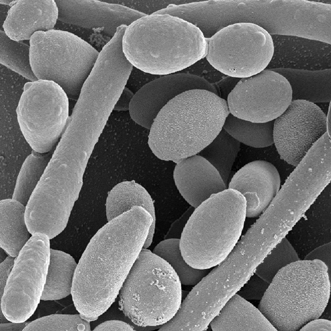
Candida is a naturally occuring yeast that lives in the large bowel, its role is actually to feed the good bacteria that help our bodies to stay healthy. If these good bacteria are killed off, through the use of antibiotics, oral contraceptives, steroids, prolonged illness, stress and poor diets, this results in an overgrowth of candida....which is when the problems start!
An overgrowth of candida can lead to the problem to developing into a 'parasitic fungus', and given time this parasitic fungus can penetrate through the genito-urinary tract and bowel wall, into the bloodstream, and circulate through the whole body. Once this happens, Candida can cause a variety of symptoms, ranging from very vauge digestive complaints and a general 'hung over' feeling, to extreme fatigue, depression, and listlessness. Obviously these symptoms can be indicative of many other diseases and imbalances in the body, so it is important to get a Candida Test done, your GP can do a blood test, or if you'd prefer to self test we highly recommend the Candida5 test (available at Evelyn Faye Nutrition) To find out more about this test click
here.

The aim of treatment for candida overgrowth is to weed out the candida, and to restablish the balance of 'good' bacteria/flora in the body, vagina, and digestive tract. As you've probably seen
there are quite a few supplements on the market that claim to kill off candida, lets look at the most effective options in my opinion.
WormwoodRecent research has found that the herb Wormwood is extremely potent against the Candida fungal infection. Renowned medical herbalist, Gerald Green, conducted a trial on patients comparing the most commonly prescribed herbs prescribed for candida (pau darco, golden seal plus a few others) and found them all relatively ineffective compared with Wormwood!
This potent herbal anti-biotic/anti-viral/anti-fungal (you name it!) helps to strengthen the immune system from the cell level up, helping to overcome the promary cause of candida infestation and a low/damaged immune system.
Wormwood also stimulates digestive enzyme production and is mildly anti-inflammatory, and is currently being trialled as an alternate to anti-malarial drugs.
Wormwood does however come with some cautions. After a couple of days of treatment on high doses, some people may suffer from a condition called Herxheimers Syndrome, causing headaches, exhaustion and some other minor symptoms. This is usually caused by the rapid reduction of Candida, and should only last 1-3 days depending on the case. Depending on the individual, and the case, I generally recommend a dose of between 3g and 10g (in seperate doses) per day for 1week.
Saccharomyces Boulardii (SB)SB belongs to a group of supplements referred to as 'probiotics' because it helps to maintain a normal balance of friendly bacteria in the intestinal and genito-urinary tract. SB is in fact a yeast (not a bacteria) that competes for space and interfers with binding of candida and other unwanted organisms on the mucous membrane wall.
Some Candida probiotic formulas will also contain other strains, such as Lactobacillus acidophilus and Lactobacillus rhamnous. Again, depending on the case and the individual, I would recommend a probiotic supplement 3 x daily during candida treatment.
DietThe term 'Candida Diet' gets thrown around alot, but its hard to actually give a definitive about what this diet allows/doesnt allow, and again will be based on an individuals case. For the most part, simple dietary sugars (lollies, sugary drinks, white carbs) should be avoided, as should starchy foods, such as potatos and pasta. Depending on the practitioner, complex carbohydrates and grains (quinoa and amaranth are good options) may be allowed, and some low GI fruits may also be ok. But again, check with your practitioner on the details of what your diet may involve during treatment. This
site may give you some more ideas about the diet.
ProductsHere is a rough guide to the products that I generally recommend for my clients with vaginal and/or intestinal candida.
-
BioMedica Femicare Pessaries: each pessary contains 201mg tea tree oil, 900mcg garlic and 1.05g calendula. Use once daily.
-
Bioceuticals SB Floractive or Ethical Nutrients Candex: contains SB strain (as above) plus other probiotics to increase good bacteria and 'weed' out candida and other organisms.
-
Mediherb Bacto-Cand GI or Bioceuticals Paracea Forte: contain anti-parasitic (anti-candida) herbs in combination
Need more info about anything you've read? Give us a bell (03) 9686 0086
Written by Hannah Denham - Naturopath






 The aim of treatment for candida overgrowth is to weed out the candida, and to restablish the balance of 'good' bacteria/flora in the body, vagina, and digestive tract. As you've probably seen
The aim of treatment for candida overgrowth is to weed out the candida, and to restablish the balance of 'good' bacteria/flora in the body, vagina, and digestive tract. As you've probably seen

